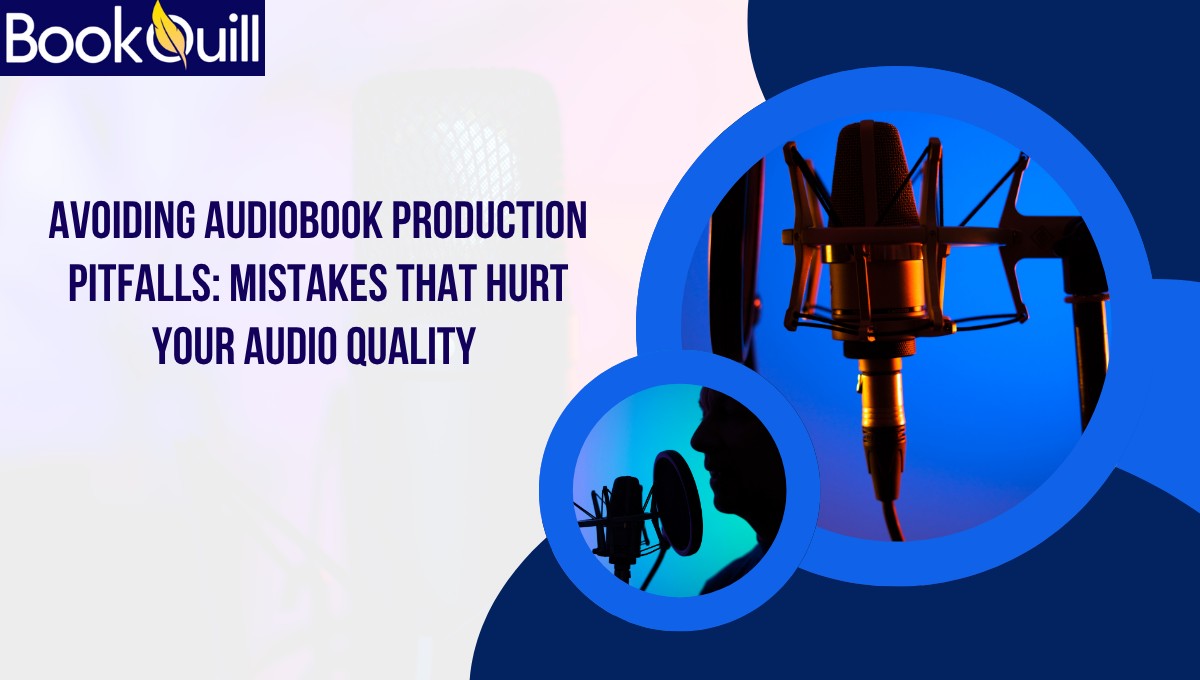Avoiding Audiobook Production Pitfalls: Mistakes That Hurt Your Audio Quality
It’s been over a hundred years since audiobooks first entered the scene. What began as a tool of accessibility for...

It’s been over a hundred years since audiobooks first entered the scene. What began as a tool of accessibility for the visually impaired has now become a booming entertainment medium embraced by listeners across the globe.
With this surge in popularity came an explosion of audiobook production—new companies, indie publishers, and eager authors racing to get their stories into listeners’ ears. But here’s the thing: rapid growth often drags rookie mistakes in its wake.
For every great audiobook, there’s another ruined by mistakes that could’ve been avoided. I’ve worked on more audiobook projects than I can count, and trust me—these pitfalls are predictable, preventable, and painful when ignored.
So, buckle up. In this blog, I’m breaking down the most common missteps authors and publishers make when diving into audiobook production—for the first time or the fiftieth. Let’s save your story from sounding second-rate.
Why Audio Quality Can Make or Break Your Book
Did you know that narrators can make or break audiobook experiences? Around 60% of listeners ditched an audiobook because they didn’t enjoy the narrator. To stand out, you need a unique voice, good sound, and top audio quality to build a lasting connection with your listeners.
Let’s shine a spotlight on why audio quality isn’t just important. Picture this: you fire up an audiobook and you’re immediately hit with static, background hums, and a narrator who sounds like they’re racing the clock or half-asleep at the wheel.
No rhythm, no emotion, just awkward breath pauses in all the wrong places. Would you stick around for hours of that? Of course not. And here’s the kicker—you wouldn’t just ditch the audiobook; you’d blame the book itself. Doesn’t matter how brilliant the plot is; if the delivery’s trash, the whole thing sinks. That’s why audio quality isn’t just part of the product—it is the product.
Common Mistakes Made in Audiobook Production
1. Recording in the Wrong Environment
Your Room Is Ruining Everything
Let’s be real—your closet is not a recording studio, no matter what DIY hacks you’ve seen floating around the internet. If you’re serious about audiobook production, you need a space that treats your voice with the respect it deserves. No one wants to hear your neighbor’s dog barking mid-monologue or the hum of your fridge breaking the flow of a heartfelt scene.
If you don’t have access to a proper studio, book one. Want to go the solo route? Fine—but do it in a space built for the job. Better yet, work with professional audiobook services that handle the recording and editing for you. Whatever you choose, one thing’s non-negotiable: never trade quality for cheapness. Your listeners will hear the difference—and they won’t forgive it.
Quick Fixes for a Better Space
You don’t need a $10,000 studio to get clean sound, but you do need to respect your recording space. Throw up some heavy blankets, invest in foam panels, or use a reflection filter around your mic. Anything that kills reflections and absorbs sound is your new best friend. And if you’ve got the budget, rent a pro studio for a day or two. It’s cheaper than re-recording your whole book—or worse, releasing it and regretting it.
2. Using the Wrong Gear—or Using It Wrong
Gear Isn’t Everything—But It’s Close
When it comes to DIY audiobook production, you could have a voice that gives Elvis Presley a run for his money—but if you’re recording on your phone with a $10 USB mic? Congratulations, you’re steering straight into disaster.
You won’t just wreck the audio—you’ll sabotage your entire story. All that effort, all those words, drowned in hiss, static, and amateur hour sound. The plot won’t matter if the listener can’t make it past chapter one without cringing.
Minimum Viable Setup for Pro Sound
Here’s the bare minimum for sounding legit: a solid XLR condenser mic, a clean audio interface, a pop filter, and a pair of closed-back headphones. That’s your holy gear quartet—don’t cheap out on it. And for the love of everything audio, kill the noise. Silence your phone, shut off the AC, unplug that buzzing fridge from hell. Your mic hears everything, and so will your listeners.
Now, if all that sounds like too much hustle, you’ve got an easy out: go with custom audiobook production services. They’ll handle the gear, the setup, and even bring in pro narrators who know how to keep your story’s tone locked in. No stress, no guesswork—just studio-grade results that sound as good as your book deserves.
3. Narrating It Yourself (When You Shouldn’t)
Voice Matters More Than You Think
Now, when it comes to narration—you might’ve written an absolute banger of a story. But that doesn’t automatically mean you should be the one reading it. The problem starts when you try to do everything yourself. If you’ve got experience behind the mic, sure, go for it.
But if not?
No one’s signing up to suffer through your monotone delivery, awkward pacing, or mumbling through emotional moments. That’s where hiring a solid audiobook production team—or investing in one of the top-tier audiobook provider packages—becomes a game-changer. They don’t just record your book, they elevate it.
Should You Hire an Expert?
Be honest with yourself—if your voice lacks clarity, energy, or range, hand it off. A professional narrator knows how to bring characters to life, keep the pacing tight, and actually perform your words, not just read them.
Look for someone in audiobook production companies whose voice matches your genre, who brings vocal consistency, and who’s got a portfolio you can hear. A great narrator doesn’t just tell your story—they elevate it.
Your Story Deserves Better Than a Busted Mic
Audiobook production isn’t the place to wing it. One botched narration, one hissy recording, or one clumsy editing job can turn your literary masterpiece into an audio disaster. If you’re serious about reaching the fast-growing audience of audiobook listeners, you need to treat your production like the high-stakes game it is.
That’s where premium audiobook marketing services come into play—not just making your book sound phenomenal, but getting it heard by the right ears. From studio-quality production to strategic promotion, these services ensure your audiobook isn’t just another file floating in the void—it’s a polished product with a presence. Because in the end, your story deserves more than a voice. It deserves an audience.
Got Questions? Here’s the Audiobook Reality Check
1. Can I produce a good-quality audiobook at home?
Yes, if you’re willing to invest in the right gear and environment. But DIY isn’t always cost-effective if you end up re-recording or editing endlessly. For guaranteed quality, outsourcing to professionals is often the smarter play.
2. Is hiring a narrator really necessary?
Not always. If you’ve got acting chops, clarity, and consistency, go for it. But for most authors, a professional narrator can transform a decent audiobook into a magnetic performance listeners can’t pause.
3. What’s the difference between audiobook production and audiobook marketing?
Production is all about creating the audiobook—recording, editing, mastering. Marketing is how you sell that polished product. Premium audiobook marketing services handle everything from promotional strategies to platform placement so your audiobook actually gets heard.
4. How much should I expect to spend on a professional audiobook?
Rates vary depending on book length, narration talent, and production quality. Expect anywhere from $1,000 to $5,000+, but remember—it’s an investment in a format with long-term earning potential.
5. Can audiobook quality really impact my book reviews?
Absolutely. Poor audio quality is one of the top reasons for bad reviews and refund requests on platforms like Audible. If the sound distracts from your story, it’s game over.



